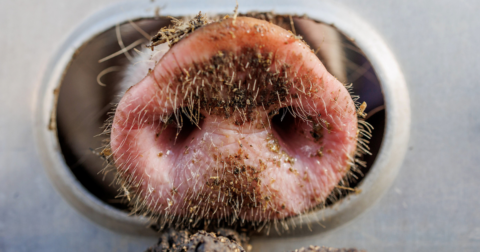News
Republicans’ New Farm Bill Takes Aim at Animal Welfare and Pesticide Regulations
Policy•8 min read
News
Representative Veronica Escobar introduced new legislation to curb slaughter of downed pigs.

News • Factory Farms • Policy

Words by Gaea Cabico
Each year, between 500,000 and one million pigs too weak or injured to stand without assistance — known as “downed” pigs — are sent to slaughterhouses in the United States. The animals can end up downed from on-farm or transport injuries, poor handling, illness or extreme stress. Some public health experts worry about health risks from consuming pork from downed pigs, which is not disclosed to consumers on the package. While the U.S. Department of Agriculture bans the slaughter of adult downed cattle and veal calves, there is currently no federal prohibition on slaughtering nonambulatory pigs.
Representative Veronica Escobar of Texas wants to change that. In late July, she reintroduced a bill seeking to prohibit the slaughter of downed pigs and improve handling rules to keep them out of the food supply. The measure cites the abusive use of drugs to increase growth rate and muscle mass by industrial pork farms and the “ineffective, inherently cruel” federal transport laws that can leave pigs unable to walk.
Called the Pigs and Public Health Act, the proposed legislation would prohibit some growth-boosting drugs and require safeguards during transport: protection from high winds, rain and snow, prohibit transportation at extreme temperatures, access to water and limits on overcrowding.
While the bill does not guarantee full animal welfare standards, it is a step toward minimally better treatment, public health veterinary expert Gail Hansen tells Sentient.
The bill would also extend “common sense and long-overdue protections to pigs, ensuring that pigs would no longer be dragged, prodded, kicked or forced to slaughter when they are too sick or injured to stand,” Alicia Prygoski, strategic legislative affairs manager at the Animal Legal Defense Fund, told Sentient in an email.
“For years, Congress has failed to support regulations in the U.S. pork industry that ensure safe working conditions, the prioritization of public health and humane treatment for farmed animals,” Escobar said in a press release. In the past, she has introduced a separate measure to ban the use of gestation crates.
The bill was filed against the backdrop of a House Agriculture Committee hearing on the impacts of California’s Proposition 12, which bans the sale of pork, veal and eggs from animals raised in the most extreme confinement, mandating slightly more space for gestating pigs. It also comes amid the introduction of the Save the Bacon Act by Iowa Rep. Ashley Hinson, which seeks to protect the ability of livestock producers to sell their products across state lines.
In the absence of clear federal protections, downed pigs are often subjected to harsh and inhumane treatment at slaughterhouses. According to animal welfare group Mercy for Animals, workers sometimes use forklifts or resort to rough handling like shocking, hitting or dragging to move downed pigs to slaughter. These animals also often endure hours without food or water in dirty pens before being killed.
The bill would “close that loophole” in current slaughter rules, says Hansen. She notes that under current practice, slaughterhouse workers could give pigs some “grace period” to see if they recovered enough to walk before killing them.
The National Pork Board offers a program called Pork Quality Assurance Plus (PQA Plus) aimed at helping producers implement best management practices that meet food safety standards and emphasize the proper and humane handling and treatment of pigs. Producers earn certification by completing an education program. After certification, they can earn PQA Plus site status by passing an on-farm inspection.
However, the animal protection group Mercy for Animals has argued in a white paper that PQA Plus falls short of its stated goals to protect and promote the well-being of pigs. It says the program does not require the use of pigs bred for better health and welfare nor does it mandate environments that allow pigs to engage in natural behaviors.
The proposed Pigs and Public Health Act would improve animal welfare for pigs in the food system, requiring the USDA secretary to develop policies and procedures for the humane euthanasia of nonambulatory pigs. Under federal regulations, cows are euthanized if pre-slaughter inspection finds them downed. The USDA did not respond to Sentient’s request for comment.
Enforcing humane euthanasia of downed pigs at slaughter would likely have little effect on the daily operations of industrial farms overall however, given the relatively small number of downed pigs, Prygoski said in an email. She, however, stressed that “it would protect those individual pigs, offer guidance to workers on how to handle them and prevent foodborne illness and zoonotic disease outbreak.”
If passed, the proposed legislation would also require the USDA and the Centers for Disease Control and Prevention (CDC) to study the public health risks posed by nonambulatory pigs.
“The risk that downed pigs pose to public health continues to be unaddressed even as we see the rise of animal-based illnesses like bird flu and maintained use of a factory farming model that increases the likelihood of infectious diseases in humans from animal origins,” Escobar said.
There’s very limited research on the public health risks specifically linked to downed pigs, but evidence from poultry and cattle shows that sick or downed animals can carry bacteria and viruses that pose health risks to slaughterhouse workers and, potentially, consumers, says Hansen, who also served as a state epidemiologist and public health veterinarian for the Kansas Department of Health and Environment.
Hansen says the most likely disease culprits are salmonella, campylobacter, E. coli, influenza viruses and MRSA infection, a staph that can be resistant to several antibiotics.
Influenza viruses and MRSA infection are primarily a concern for workers who handle the animals, rather than for consumers, according to Hansen. Yet given the other potential pathogen risks, Hansen still feels the bill could, on the whole, improve food safety. The proposed bill would improve animal welfare for pigs too. “This is really looking at the very last day of the pig’s life, essentially,” Hansen says. “At least, for the end of their life, they’re treated better.”